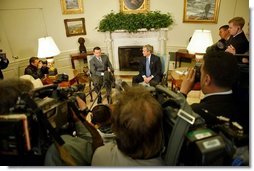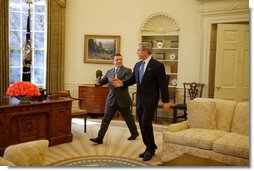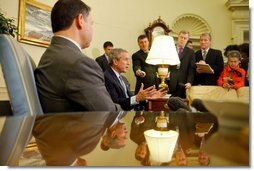
- Afghanistan
- Africa
- Budget Management
- Defense
- Economy
- Education
- Energy
- Environment
- Global Diplomacy
- Health Care
- Homeland Security
- Immigration
- International Trade
- Iraq
- Judicial Nominations
- Middle East
- National Security
- Veterans
|
Home >
News & Policies >
March 2005
|
For Immediate Release
Office of the Press Secretary
March 15, 2005
President and King Abdullah of Jordan Discuss Middle East Peace, Trade
The Oval Office
11:48 A.M. EST
PRESIDENT BUSH: It's my real pleasure to welcome His Majesty back to the Oval Office. Your Majesty, every time you come, I really enjoy our conversation. His Majesty leads a great country in the midst of a part of the world that is changing, changing for the better. And I want to thank His Majesty for his leadership, his understanding about the need for reform, his strong alliance, his clear vision that the world needs to jointly fight terror. And I really appreciate you coming.
KING ABDULLAH: Thank you. I'd like to thank the President for welcoming me back to Washington. As always, our discussions have been very fruitful, to try and make the Middle East a better place. We had the chance to discuss the issues of the peace process, how we can move that forward, and, obviously, our commitment to a regional reform. And as always, we've come away with some very good ideas, and a decent way of being able to look at the future.
PRESIDENT BUSH: We'll answer a couple of questions. Jennifer.
Q Yes, sir. Thank you. The Lebanese Maronite Patriarch you're meeting with tomorrow supports integrating Hezbollah into the political mainstream.
PRESIDENT BUSH: A little louder, excuse me.
Q The Lebanese Maronite Patriarch you're meeting with tomorrow supports integrating Hezbollah into the political mainstream in his country. Are you willing to consider that kind of role for Hezbollah?
PRESIDENT BUSH: Well, first, I look forward to listening to the Patriarch. It's going to be a very interesting discussion. One of the messages I want to say is that my meeting with the Patriarch is in no way embracing any religion for Lebanon; it is a way for me to speak to people that believe the Lebanese society ought to be free.
We view Hezbollah as a terrorist organization, and I would hope that Hezbollah would prove that they're not by laying down arms and not threatening peace. One of our concerns The Majesty and I discussed is that Hezbollah may try to derail the peace process between Israel and the Palestinians. And it's very important that this peace process go forward, for the sake of the Palestinians, for the sake of the Israelis, and for the sake of all the people in the region. But Hezbollah has been declared a terrorist organization by the United States because of terrorist activities in the past.
Q Mr. President, the Arab peace initiative in Beirut has defined the ground for resolving the Arab-Israeli conflict, which would be also re-articulated in the coming Algeria summit. What would be the role of the United States in the coming stage to push for with that initiative? And when it comes to reforms, how would the United States help the Arab world, and Jordan in particular, in pushing forward?
PRESIDENT BUSH: Well, I appreciate that question. First, let's start with Jordan. One of the things we've done is entered into trade negotiations with Jordan, so that commerce between our countries can flow better. It's much easier to reform when there's prosperity, when people are able to see His Majesty's vision about a prosperous future. And I -- the other way to encourage reform is to herald examples of reformers, people who are willing to put mechanisms in place that respond to the voice of the people. And His Majesty has done that.
 We look forward to hearing the results of the conference in
Algeria. The Foreign Minister briefed us on His Majesty's plans and
the Jordanian government's plans to have accountability measures in
place, so as to help measure as to whether or not reforms are going
forward.
We look forward to hearing the results of the conference in
Algeria. The Foreign Minister briefed us on His Majesty's plans and
the Jordanian government's plans to have accountability measures in
place, so as to help measure as to whether or not reforms are going
forward.
As for the Palestinian-Israeli issue, the role of the United States will be to continue to urge both parties to make the sacrifices necessary -- sacrifice meaning that Israel must withdraw from the settlements, there must be contiguous territory for a Palestinian state -- into which a Palestinian state can grow. The Palestinians, in their part, must continue to work hard to fight any terrorist activities within the territories, and the Arab world must continue to work together to help Palestine build the necessary structures for democracy.
And I believe progress is being made. I said in my State of the Union address to our country that I believe peace is within hand and that the United States government will do that which is necessary to help move the process forward.
One of the things we've done is we've recently sent a general, Your Majesty, to the region to help the Palestinians have an effective security force. I believe President Abbas is desirous of developing a state that will live side by side with Israel in peace. And we recognize that the Palestinians need help in consolidating security forces and training security forces to defeat the terrorists who would like to stop the march of freedom.
Let's see -- Steve.
Q Sir, a new poll says 55 percent of Americans oppose your proposals on Social Security. Do you worry you're losing ground here? Is it a question of getting your message across, or does the plan need to be changed?
THE PRESIDENT: Well, first, in that same survey I was heartened to see that over two-thirds of the Americans recognize we have a problem. And, therefore, the administration and members of both parties in the legislative branch must come together to permanently solve the problem. My first concern was that members of Congress would think the public didn't think there was a problem -- but they do. And I am mindful that when the public says there's a problem, we've got to work to solve it.
 Secondly, I was also heartened to see in that survey that many
people believe younger workers ought to be allowed, at their option, to
set aside some of their own money in a personal savings account. That
principle was embraced by a lot of folks in the survey.
Secondly, I was also heartened to see in that survey that many
people believe younger workers ought to be allowed, at their option, to
set aside some of their own money in a personal savings account. That
principle was embraced by a lot of folks in the survey.
My view about taking on a tough issue is that, that's what the American people expect a President to do. And I look forward to working with members of the Congress to develop a plan. I've suggested ideas. I've suggested that we stop partisan bickering and come together to work for a solution. And I'm looking forward to finding that solution. That's what the people expect.
So, no, listen, I'm just getting started on this issue, Steve, and I'm enjoying every minute of it. I like to take big issues to the American people. I like to say to the American people, you sent us here to Washington for a reason, and that is to solve problems. And we've got a problem, the American people say we've got a problem, and they're going to expect people to come to the table, and they're not going to like it when they see people not coming to the table.
Q May I ask the King a question? May I ask the King a question, please?
THE PRESIDENT: That's up to His Majesty. He's a generous guy -- (laughter.)
Q Your Majesty, since the new Palestinian leadership took over, what's your personal vision for the region at this time?
KING ABDULLAH: Well, I'm, again, very supportive of President Abbas. I think he's a man of his word and I think that you'll see him give 110 percent to deal with the security issues and to push the process forward.
I truly believe that in this man Prime Minister Sharon has a partner for peace, and I'm very optimistic that between the two leaders that the process will go forward and go forward positively.
END 11:56 A.M. EST



